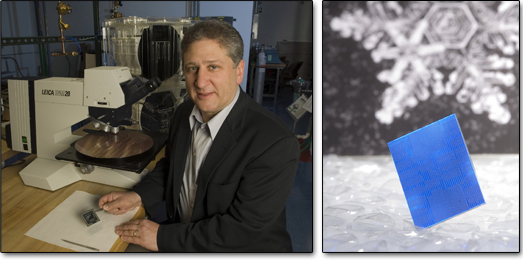Maybe Apple Should've Stayed with Long-time Partner After All?
| by Joe Leo, Columnist | May 4, 2007 |

EX-FACTOR: Apple's "ex," IBM has come to the forefront of innovation by announcing a new chip-making process yesterday. At left is Dan Edelstein with an experimental version of IBM's latest generation microprocessor, while at right is the new IBM "Airgap Processor" that utilizes this new technology. [PHOTOS: �2007, IBM® Corp.-- authorized use via NewsMarket (graphic by J. Leo)]
NEWS/COMMENTARY: (5.04.07)-- Yesterday, IBM announced that they had made a major technological breakthrough in the chip-making process that will allow them to manufacture faster and smaller chips than previously available, and because of this, power consumption is reduced by 15 percent.
Looks like someone is on the cutting edge of innovation, and unfortunately, this time Apple isn't on the same side of the fence as IBM.
From the news release (not an official IBM press release):
In nature a phenomenon called "self assembly" is a delicate process that forms seashells, creates the enamel on teeth and transforms water into complex snowflakes. IBM Research has, for the first time ever, applied "self assembly" to create computer chips that are faster and smaller than ever before. IBM has figured out how to control and perfect the self assembly process to create trillions of tiny, nano-sized holes across a chip, which speed electrons that flow across wires inside the chip and reduce the power consumed by 15 percent. These chips will go into our everyday electronics such as cell phones, computers and gaming consoles, an advance that is set to drive the equivalent of two generations of Moore's Law.
This all sounds great and has many ramifications for future applications. How could Apple ever have known--when they decided that they would switch over to Intel chips--that IBM would put itself at the forefront of innovation by leaps and bounds, just a couple of years later?
That single statement alone smells like a hot-baked Granny Smith right out of the oven. "Computer chips that are faster and smaller than ever before." The type of innovation and goals that Apple strives for.
We've seen it over the past few years. The faster being, of course, the move to Intel chips. The size factor being, slimming down the iMac ("Where did the screen go?"), and making the iPod line thinner, lighter, and smaller than ever before.
So why in heck haven't we seen the release of a 12-inch MacBook Pro yet, for crying out loud?
People say it will and it won't happen, the debut of a 12-inch MacBook Pro that will be smaller than the original ultra-portable Apple laptop, the 12-inch PowerBook G4. The underlying technologies that will contribute to this is the ever-famous use of NAND flash memory and getting rid of an optical drive.
The latter is faced with some criticism, like, how can you not have an optical drive on a computer?? Well, if you think about it, most software is available today as downloads. Speaking of flash memory, they can make software available on that form of media and install it via USB flash drive, or on a memory card via card readers.
Apple could even repeat history by being the first to get rid of the "now defunct" optical drive. (Like they did with the first iMac and got rid of the old floppy drive). But we digress.
Back to the main story here. With IBM's announcement yesterday of this groundbreaking new technology, and process of chip-making that will allow them to manufacture faster and smaller chips than before--as well as reduce power consumption by 15%--maybe Apple should have stayed with IBM after all? At least, for their notebook line.
(Then we'd be even closer to seeing the MacBook Pro mini, uh, the 12-inch MacBook Pro).
Find the lowest price on a new or refurbished Mac at MacPrices.
NOTE: The news release contained within was obtained from The News Market, a news service we are a member of, which served as the basis for our story.
![]()